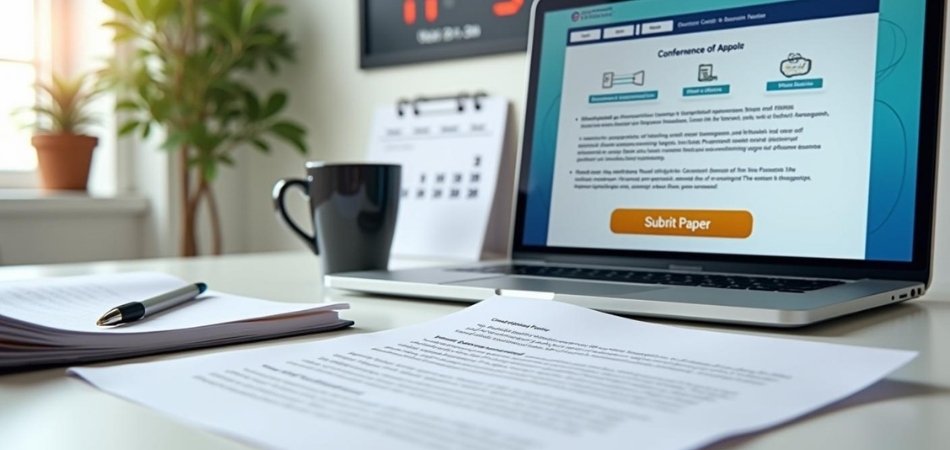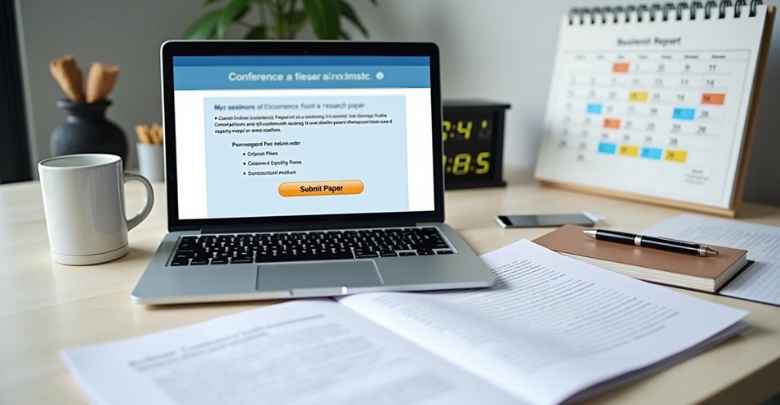Sharing your research at a business conference can open doors to new collaborations and professional growth. But you may be asking: Can I submit a research paper to a business conference?
The answer is yes, you can submit a research paper to a business conference. To submit your research, you will need to choose a conference that aligns with your topic. Follow the guidelines, prepare a strong proposal, and ensure your paper resonates with the conference’s goals.
Curious to know more about the process? Take a look at this guide to learn everything you need to know and succeed at your next conference.
Can I Submit a Research Paper to a Business Conference?
The opportunity to present your research at a business conference is a wonderful way to share your expertise, meet industry professionals, and get recognized for your work. It can also open doors to collaborations and help you stay updated with industry trends. Here’s how you can submit the research paper effectively.

Select the Right Conference
Choose a conference aligned with your research focus and professional goals. Look for events that address your area of expertise and have an audience likely to value your insights. Whether it’s a business conference in Canada or any other international event, choosing the right platform maximizes the relevance and impact of your work.
Read the Submission Guidelines
Every conference has specific submission requirements that you must adhere to. These may include word limits, abstract formats, and referencing styles. Thoroughly review the guidelines to ensure your submission meets the criteria. Following these instructions demonstrates professionalism and increases your chances of acceptance.
Prepare a Compelling Abstract
Your abstract is often the first impression reviewers have of your work. Write a concise, engaging summary that highlights your research objectives, key findings, and relevance to the conference theme. A well-crafted abstract can capture your attention and make your submission stand out.
Ensure Your Topic is Relevant
Make sure your research matches the conference’s objectives and audience interests. Use examples or case studies that align with the industry focus of the event. Conferences covering relevant topics that are more likely to value work that resonates with their primary goals.
Format and Organize Your Paper Professionally
A polished, professional layout is essential for creating a strong impression. Organize your content with clear headings, logical flow, and accurate citations. Attention to detail in formatting ensures your work is not only readable but also credible to reviewers.
Submit Your Paper on Time
Missing deadlines is one of the easiest ways to have your submission overlooked. Mark submission dates clearly on your calendar and complete your work ahead of time. Early submissions also allow for revisions if errors are identified.
Highlight the Practical Impact of Your Work
Explain how your research can address real-world challenges or drive innovation within the industry. Emphasizing the practical applications of your findings will make your work more appealing to reviewers and attendees.
Prepare for Presentation Requirements
If your paper is accepted, you’ll likely need to present your findings. Practice delivering your presentation clearly and confidently. Consider what things to bring to a Business Conference to improve your session, such as visual aids or printed materials.
Seek Feedback Before Submission
Before sending your paper, ask trusted colleagues or mentors to review it. Constructive feedback can help identify weak areas, improve clarity, and ensure your submission is strong. This collaborative effort increases the quality of your work.
Follow Up After Submission
After submitting your paper, stay engaged with the conference organizers. Respond promptly to any requests for additional information or edits. Maintaining professional communication ensures your submission process goes smoothly.
Business conference submissions require careful preparation, attention to detail, and dedication. By following these steps, you’ll not only increase your chances of acceptance but also maximize the impact of your work. Take the first step today and let your research shine!
How to Choose the Right Topics for Your Research Paper?
The choice of the right topic is crucial to the success of your research paper. A well-chosen topic not only aligns with your expertise but also resonates with your audience. Here’s how to identify the perfect subject for your research paper.
Align With the Conference Theme
Analyze the conference’s theme or focus before you register. Topics that align with the conference’s goals and interests are more likely to grab the attention of reviewers. From diverse topics, you must identify the themes that suit your research and contribute to meaningful discussions before joining a business conference. Reviewing what topics are covered at a business conference can also help you refine your focus and ensure your research is relevant to the event’s core objectives.
Address Real-World Challenges
Consider choosing a topic that solves a problem or offers practical solutions. Research that addresses challenges faced by professionals in your field is highly relevant and engaging. Highlighting actionable insights or innovative approaches can make your paper stand out to both reviewers and attendees.
Play to Your Strengths and Expertise
Select a subject that matches your skills, knowledge, and experience. A strong grasp of the topic allows you to research deeply and provide compelling insights. Conference audiences appreciate well-researched content from someone who clearly knows their field of study.
Explore Emerging Trends or Innovations
Investigating the latest developments in your industry can lead to a compelling research topic. Emerging trends are often of great interest at conferences, stimulating curiosity and discussions. Choose a subject that demonstrates forward-thinking and showcases your ability to stay ahead of the curve.
Focus on Audience Relevance
Think about the audience you’ll be addressing at the conference. Research papers that are relevant to their level of expertise and interests tend to be more impactful. Ensure that your content is relatable, insightful, and adds meaningful value to your audience.
Choosing the right topic for your research paper is about finding the balance between your strengths and what resonates with your audience. By following these steps, you’ll be well on your way to creating a research paper that captures attention and delivers impact.
Preparing Your Research Paper for Submission: Key Steps
Writing a research paper is a significant achievement, but the journey doesn’t end there. Ensuring your paper is polished and submission-ready is vital to making an impact in your field. By focusing on key preparation steps, you can maximize its chances of acceptance and readership.
Refine Your Content and Structure
Revisiting your manuscript is essential to ensure clarity, coherence, and logical flow. Check that your research objectives, methodology, results, and conclusions are aligned and build upon each other seamlessly. A well-structured paper demonstrates professionalism and helps readers engage with your work.
Verify Formatting and Adherence to Guidelines
Each journal has specific submission requirements, so pay close attention to formatting guidelines. Ensure your citations, references, and overall manuscript follow the required style, such as APA or MLA. Proper formatting signals that you respect the journal’s standards and increases the likelihood of acceptance.
Proofread and Edit for Language Precision
Mistakes in grammar, punctuation, or phrasing can detract from the credibility of your work. Carefully read through your paper multiple times or consider using a professional editing service. Clear and precise language is critical for conveying complex ideas effectively.
Prepare a Strong Abstract and Title
The title and abstract are often the first parts of your paper that readers or reviewers encounter. Craft an engaging, informative title and a concise abstract that highlights your research’s significance and key findings. These elements set the tone for your paper and can determine its initial reception.
Submit and Follow-Up Professionally
After submission, keep track of the review timeline and respond promptly to any queries from the journal. Demonstrating professionalism and readiness to address feedback reflects well on your commitment as a researcher. Patience during this stage is crucial.
Preparation Guide: Items to Bring for Conference Research Presentation
Presenting research at a conference is a great opportunity to showcase your hard work and connect with like-minded professionals. Careful preparation ensures your presentation goes smoothly and leaves a positive impression. Bringing the right items can make all the difference in delivering a memorable and professional experience. Below are some essential items:
Presentation Tools and Backups
Ensure you pack all the tools necessary for your presentation, such as a laptop, charger, and any required adapters for the venue’s equipment. Keep a backup of your slides and materials on a USB drive or cloud storage, ensuring you’re prepared for unexpected technical issues. If using printed visuals or handouts, carry a few extra copies to accommodate additional attendees.
Appropriate Professional Attire
Conference attire should reflect professionalism while keeping you comfortable for a long day. Pack outfits that align with the event’s dress code, considering the possibility of formal networking events. Including a pair of comfortable shoes is crucial for navigating the venue and interacting confidently throughout the day.
Networking and Documentation Essentials
Attending conferences across cities in different countries like Canada provides valuable opportunities to share research and build global connections. Key essentials to bring to a business conference in Vancouver include business cards for seamless networking and a printed summary or poster to present your research effectively. Proper preparation ensures deeper engagement during breaks and networking sessions.
Personal Comfort and Wellness Items
Long conference days can be tiring, so pack snacks and a refillable water bottle to keep yourself energized. Be mindful of any personal necessities like medications or hygiene products that will keep you comfortable. Consider adding a reusable shopping bag for swag or materials collected during the event.
Confidence and Engagement Aids
Prepare a brief yet impactful elevator pitch to succinctly convey the essence of your research. Small giveaways, like branded pens or bookmarks, can serve as conversation starters and leave a lasting impression. So, bring a confident mindset to engage effectively with your audience.
Being well-prepared ensures you can focus on sharing your research and maximizing the event’s opportunities. With thoughtful planning, you’ll exude professionalism and make the most of your conference experience.
Common Mistakes to Avoid When Submitting a Research Paper
Submitting a research paper to a conference is a rewarding yet intricate process that demands attention to detail. Even seasoned professionals can fall into common traps that may affect their chances of acceptance. By being mindful of the below mistakes, you can significantly improve the quality of your submission and its likelihood of success.
Neglecting Submission Guidelines
Every conference has specific submission guidelines that authors must follow, such as formatting, length, and citation styles. Ignoring these rules can result in outright rejection, no matter how brilliant your research is. Carefully review the requirements and ensure your paper complies with them before submission.
Overlooking the Importance of Revisions
Submitting a first draft without thorough revisions is a mistake that can undermine your hard work. Typos, grammatical errors, and unclear arguments can distract reviewers from your research’s value. Take time to revise your paper multiple times and, if possible, seek feedback from colleagues or mentors.
Failing to Align with the Conference Theme
Submitting a paper that doesn’t align with the conference’s focus is a missed opportunity. Review the conference’s theme and call for papers to ensure your research is relevant. Highlight how your paper contributes to the specific topics or questions the conference seeks to address.
Missing Deadlines
Time management is crucial when submitting a research paper. Missing the deadline, even by a few hours, can disqualify your paper automatically. Keep track of submission timelines, and aim to complete your paper well before the deadline to avoid last-minute stress.
Overcomplicating Your Paper
While showcasing your expertise is essential, overly complex language or excessive jargon can alienate reviewers. Your paper should communicate your findings clearly and concisely. Aim for a balance of technical accuracy and readability to engage a wider audience.
Frequently Asked Questions (FAQs)
Submitting a research paper to a business conference often raises questions about the process, requirements, and expectations. Here are some frequently asked questions that address additional aspects to help you better understand the submission journey.
Can I Submit a Paper That Was Previously Presented Elsewhere?
Yes, but it depends on the conference’s guidelines. Some events accept previously presented research, especially if it aligns with their theme or audience. Always check the specific policies of the conference to avoid disqualification or redundancy.
Do I Need to Co-author a Paper to Submit It?
No, you don’t need to have co-authors to submit a research paper. Many conferences welcome individual submissions, provided the work meets their standards. However, collaborating with co-authors can enhance the depth and quality of your research.
Is It Mandatory to Attend the Conference in Person if My Paper is Accepted?
Not always. Many conferences now offer virtual participation options for presenters. However, attending in person often provides better networking opportunities and engagement with attendees. Check the event’s format and policies for clarification.
What Happens if My Paper Isn’t Accepted?
Rejection doesn’t mean your research lacks value. It could simply be due to high competition or misalignment with the conference theme. Use the feedback (if provided) to refine your paper and submit it to another suitable event.
Can I Present Research That is Still in Progress?
Yes, many conferences accept preliminary findings or work in progress, especially in dynamic fields. Be transparent about the stage of your research and highlight its potential contributions. This approach can spark interest and valuable feedback from attendees.
Last Words
You can share your ideas and gain recognition by submitting a research paper to a business conference. If you’ve been asking yourself: Can I submit a research paper to a business conference? The answer is a confident yes, and the journey can be highly rewarding.
By carefully choosing a relevant topic, following submission guidelines, and presenting your research professionally, you can stand out and make a lasting impression. Each step, from crafting your proposal to preparing for your presentation, helps showcase your expertise and contribute meaningfully to the conference.
Now that you know how to get started, why wait? Take the first step today and turn your research into a powerful tool for growth and impact at your next conference.





